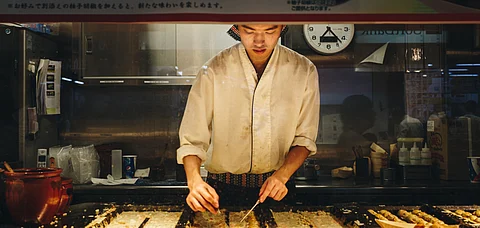
- Destinations
- Experiences
- Stay
- What's new
- Editor’s Picks
- Responsible Tourism
- CampaignsCampaigns
- Subscribe

Talking of food... would you ever try something that is B-class What if I told you that the Japs are crazy about it Japan is known for some of the world&rsquos most unaffordable food choices in the world.
Yet in the backyard of its snazzy food scene, the B-kyuu gurume movement has been earning acceptance all over. Where the homely, rich flavours of &lsquogotochi&rsquo food have found favour with gourmands. B-kyuu gurume translates to B-class, or B-grade gourmet cuisine.
B-kyuu gurume emerged as an aesthetic in the 1990s, blossoming during the ensuing &lsquoLost Decade&rsquo, as the country faced an unprecedented economic recession.
A new form of gastronomy, where local and inexpensive ingredients and flavours are prized, it has become a modern-day phenomenon. B-kyuu gurume celebrates Japan&rsquos hyperlocal eateries, the izakaya their chefs, and the basic but delicious recipes that they whip up every day.
They specialise not only at hearty favourites such as ramen-based recipes, oden, yakisoba or katsu curry, but also affordable versions of what is known typically as high-end cuisine.
When it comes to the choices, plain ol&rsquo ramen is easily the leader of the pack. Ramen, that filling, wholesome bowl of steaming soup, noodles and meat pieces, is available almost everywhere, from the alleys of the uber-urban Tokyo and Osaka, to the pretty Kyoto&mdashwhich has its special &lsquoFire Ramen&rsquo&mdashand seafood centre Hokkaido.
Sapporo&rsquos miso ramen is a veggie-heavy version where onions, bean sprouts, ginger and cabbage are stir fried before adding the soup. Yokohama even has a whole ramen-themed amusement park. Fukuoka&rsquos well-kept secret tonkotsu version features a creamy pork bone (tonkotsu) broth. Fukuoka, along with Shimonoseki, is also where another major B-kyuu offering, the motsunabe, is popular.
The hotpot meal of motsunabe, where the spiciness is offset using seasonings such as garlic, leeks, and chilli peppers, is one of the first stars of the B-kyuu revolution of the '80s.
Fujinomiya in Shizuoka Prefecture is the home of the Fujinomiya yakisoba, a much-celebrated B-kyuu gurume offering. A summer staple throughout Japan, yakisoba is a noodle-based offering featuring stir-fried veggies with oyster sauce.
Takoyaki, or octopus balls, is a specialty that typifies the gotochi branch of B-kyuu gurume. A hot favourite street snack in Osaka, where it comes from, takoyaki is made with diced octopus, pickled ginger and onion and tempura scraps.
Despite being cheap and readily available, Japan's B-kyuu gurume doesn't really equate to fast food. so don't let the happening flavours of Gyudon, the comfort meat bowl, convince you that either. This bowl of goodness, with rice, beef and sautéed onion has kaishain, or Japan's salarymen, queuing up at stalls during lunch hour.
Any discussion on Japan's B-class food movement is incomplete without a mention of Okonomiyaki. The pancake-style dish features onion, cabbage and meat filling. But what's truly marvellous is that the name of this dish comes from okonomi, meaning "how do you like" and yaki, meaning "cooked"
